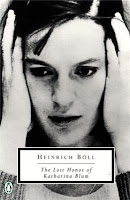So I turned to Nobel Prize winner Heinrich Böll's The Lost Honor of Katharina Blum.
This short complicated novel is more dense than The Clown, his sad, comic novel about a professional clown, with its subtext of a critique of the hypocrisy of post-war Germany. The author, or narrator, of The Lost Honor of Katharina Blum documents the crime of the beleaguered innocent heroine, and delineates the politics, police blunderings, and incendiary journalism that precipitate her violence. When Katharina was published in 1974, Böll was accused of advocating terrorism. The News, which ruins Katharina's life, was based on Germany's sensationalist right-wing paper, Bild-Zeitung. Böll tells us in a note: "Should the description of certain journalistic practices result in a resemblance similar to the practices of the Bild-Zeitung, such resemblance is neither intentional nor fortuitous, but unavoidable."
Böll's voice is bemused and half-facetious, not really objective, nor does he try to be. His is not the viewpoint of a sociologist or investigator. He mixes up bits and pieces of interrogation, interviews, and journalism out of chronological order and traces the increasing grotesqueness. The police arrest Katharina, a business-like housekeeper, after she meets a charming wanted criminal, Ludwig Götten, at a dance. Katharina entertains him at her apartment. The police do not see him leave. How did he get away? They suspect Katharina collaborated with him. And they do not believe she met him for the first time at the dance.
Böll explains his narrative stance:
"For the following account there are a few minor sources and three major ones; these will be named here and not referred to again. Major sources are: the transcripts of the police interrogation; Hubert Blorna (attorney); and Peter Hach (public prosecutor, also high school and university classmate of Hubert Blorna)."
These sources are unreliable, too, but nothing compared to the newspapers. At length he quotes excerpts from the hysterical News stories of Werner Tötges, whose exaggerations and lies--he twists the sayings of every person he interviews--drive Katharina to murder. On page three of the novel, she confesses that she shot and killed Tötges, and "requests that she be arrested, she would like to be where her dear Ludwig is."
Katharina, though not very likable, is chaste and ethical. Her love affair with Ludwig is the only romantic incident in her life.
Blorna, a lawyer, and his wife, an architect, her employers, are loyal to her. But Blorna's words, too, are twisted by Tötges. No one can survive this degree of calumny. It has spread across the nation and everyone wants to read it.
The subtitle of The Lost Honor of Katharina Blum is How Violence Develops and Where It Can Lead. That certainly sums it up.
Beautifully written, this disturbing novel is not entertaining, but rather a criticism of a period of political violence.



No comments:
Post a Comment